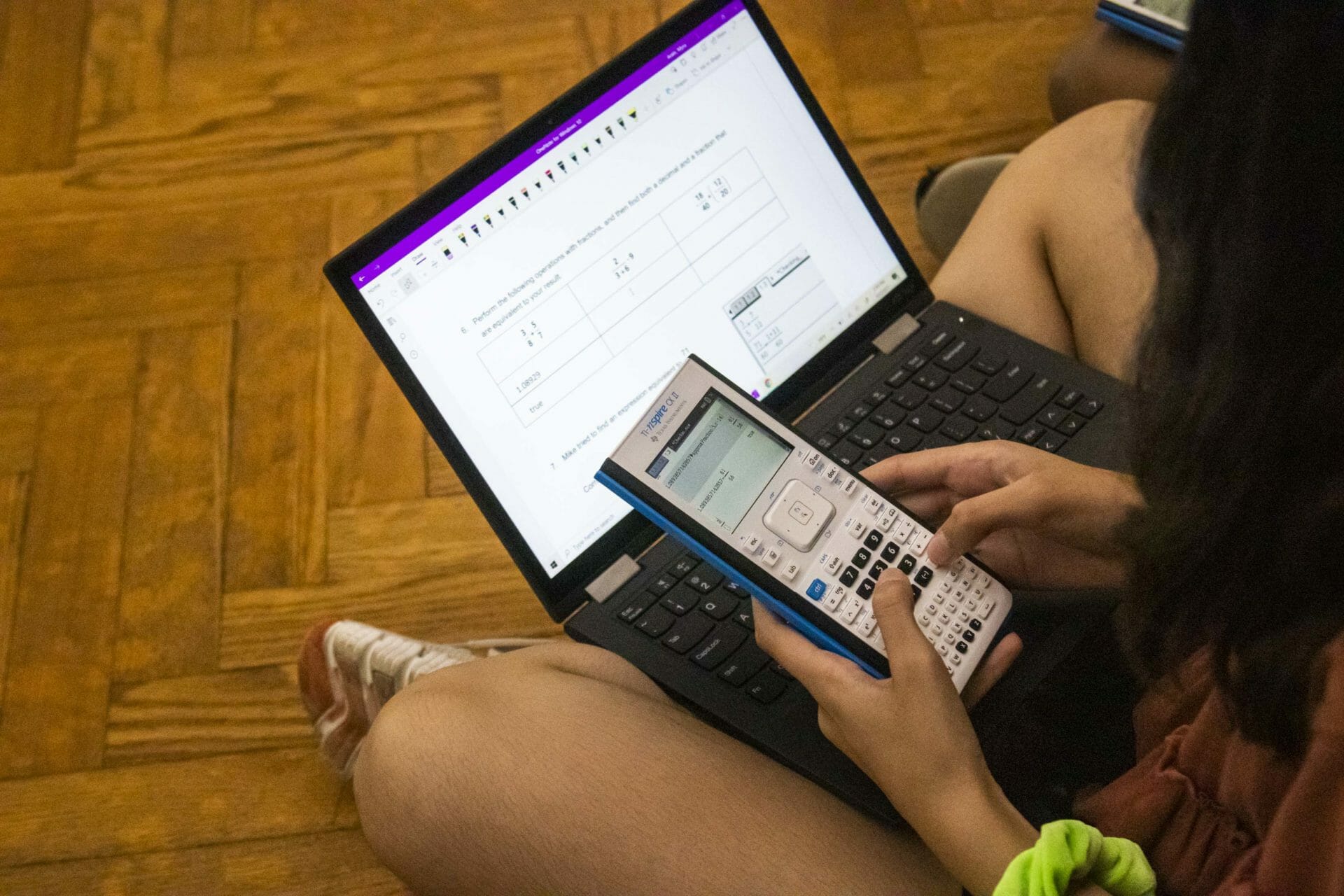During the summer months, many of our MICDS faculty members dive into professional development activities to sharpen their skills and bring new ideas into the School community. Below is just a sampling of reflections and reports from several faculty members and departments (in alphabetical order by contributor) on their professional development engagements this summer.
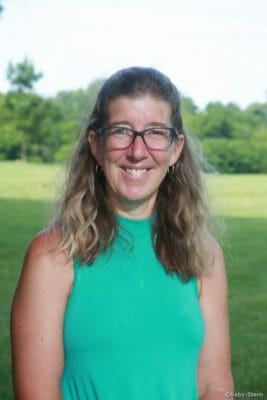
JK-12 Math Department Chair Diane Broberg held a summer professional development session to train MICDS science and math teachers to use the TI-Nspire™ CX CAS handheld calculator. While most MICDS Upper School students and faculty are accustomed to using the traditional TI-84 calculator, the TI-Nspire has been rolled out to current 8th and 9th graders with plans to roll it out to 10th, 11th, and 12th grade over the next three years. Broberg has served as a TI ambassador, technical writer, and trainer for many years and notes that the TI-Nspire is more interactive than the static TI84. It contains Microsoft Excel and Word along with more robust graphing capabilities. Students can take statistics and data within the device to manipulate bar graphs or even use the draw tool for graphing. They can also attach probes to collect data. Broberg said, “The interactive nature of the device makes it more student-centered. I can have students investigate problems versus me telling them what to do and what to expect from their results. It allows them to engage in more discovery and math on their own.” Middle School Math Teacher Jody Marberry added, “I am enjoying learning about the new features available on the TI-Nspire and how to incorporate more technology exploration into my mathematics classroom. I look forward to using the interactive software with the students when we begin our next unit on data analysis. The Ti-nSpire allows us to both send and gather data for whole group explorations.”
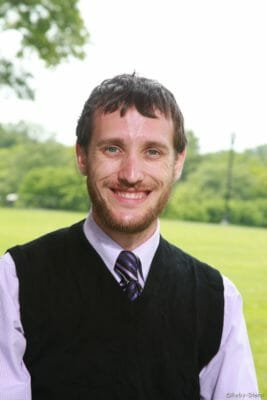 Upper School Math Teacher Travis Menghini recently completed a Master of Education in Education Technology from Park University in Kansas City. This online program included participation in a two-year cohort of 20 educators with a range of teaching experiences. Menghini said, “Since this was an online course, when the pandemic hit we didn’t miss a beat in staying connected. We were able to suspend the regular course curriculum for two weeks and focus on the technology we were working with in our school environments and how we were going to pivot when students returned after spring break. I was happy to be able to bring back ideas to share with the broader team at MICDS. Technology is so critical to the work we do.” In addition to his role as math teacher, Menghini also serves as a robotics coach, Girls Cross Country and Track coach, and serves on the committee for the First in Missouri First Tech Challenge robotics events.
Upper School Math Teacher Travis Menghini recently completed a Master of Education in Education Technology from Park University in Kansas City. This online program included participation in a two-year cohort of 20 educators with a range of teaching experiences. Menghini said, “Since this was an online course, when the pandemic hit we didn’t miss a beat in staying connected. We were able to suspend the regular course curriculum for two weeks and focus on the technology we were working with in our school environments and how we were going to pivot when students returned after spring break. I was happy to be able to bring back ideas to share with the broader team at MICDS. Technology is so critical to the work we do.” In addition to his role as math teacher, Menghini also serves as a robotics coach, Girls Cross Country and Track coach, and serves on the committee for the First in Missouri First Tech Challenge robotics events.
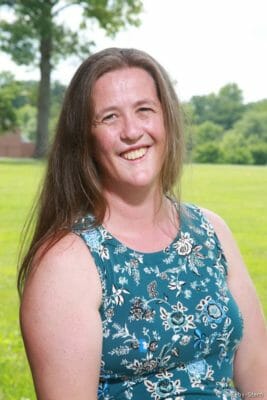 Upper School History Teacher Tanya Roth took part in Walking the Tōkaidō, a course offered through the Five College Center for East Asian Studies. Roth said, “This class was unlike any I’d done with them before because it allowed participants to (virtually) walk the 300+ mile Tōkaidō road that goes between Tokyo and Kyoto.”
Upper School History Teacher Tanya Roth took part in Walking the Tōkaidō, a course offered through the Five College Center for East Asian Studies. Roth said, “This class was unlike any I’d done with them before because it allowed participants to (virtually) walk the 300+ mile Tōkaidō road that goes between Tokyo and Kyoto.”
Roth logged her summer activities, like running, biking, and hiking, on the My Virtual Mission website, which had 17 different milestones, each based on the historic “stations” that travelers passed through. Each milestone provided details about the location and its importance and information about the city today. At other stops, the site shared information on religion, the economy, environmental issues, and tea cultivation.
In addition, course participants read articles and books, watched videos, and viewed webinars by authors and scholars. Roth said, “We read the Pulitzer finalist book Stranger in the Shogun’s City, a recent release by historian Amy Stanley. It’s a remarkable book about what life was like in the first half of the 19th century, focusing on one woman’s life. After reading the book, I watched a recorded webinar with the author and then connected with the author further on Twitter to ask follow-up questions. Another book, Japanese Inn, gave a longer history of Japan through an inn that operated for more than 400 years. Finally, You Gotta Have Wa was a fascinating book that taught me all about baseball in Japan.”
Roth added, “One of the big themes we return to again and again in history classes at MICDS is movement and geography. This class was a really fascinating case study in movement and geography for me, and I look forward to sharing some of what I’ve learned with my 7th and 9th grade students, in particular, as we explore world history in a variety of ways this year.”
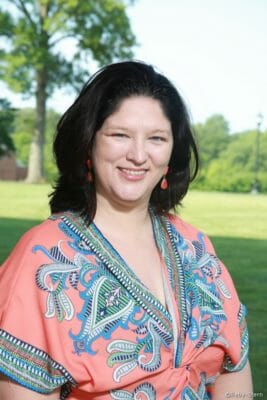 Middle School Learning Specialist Susan Taylor-Alonso attended a summer course entitled Twice-exceptional (2e) Learners at Johns Hopkins University. The course focused on recent research-based findings regarding identification and programming for gifted children with learning differences. In addition, the course participants explored the variability of learning profiles within the gifted student population and discussed approaches to assist 2e learners in nurturing their talents and supporting their challenges. Taylor-Alonso shared, “The course dispelled many common myths that are held about both individuals with learning differences and students who are gifted. It reinforced the notion that the learners in educational spaces are highly variable, and as educators, we must develop the capacity to perceive our students’ learning behaviors with a high level of nuance because learning profiles that involve giftedness and learning differences involve a great deal of complexity and asynchronous development. Students who are gifted have vulnerabilities, and students with learning differences have gifts and talents.”
Middle School Learning Specialist Susan Taylor-Alonso attended a summer course entitled Twice-exceptional (2e) Learners at Johns Hopkins University. The course focused on recent research-based findings regarding identification and programming for gifted children with learning differences. In addition, the course participants explored the variability of learning profiles within the gifted student population and discussed approaches to assist 2e learners in nurturing their talents and supporting their challenges. Taylor-Alonso shared, “The course dispelled many common myths that are held about both individuals with learning differences and students who are gifted. It reinforced the notion that the learners in educational spaces are highly variable, and as educators, we must develop the capacity to perceive our students’ learning behaviors with a high level of nuance because learning profiles that involve giftedness and learning differences involve a great deal of complexity and asynchronous development. Students who are gifted have vulnerabilities, and students with learning differences have gifts and talents.”
Third and Fourth Grade Teachers participated in a summer workshop to implement the use of Mentor Sentences to teach grammar and vocabulary. They also formed a peer coaching group to observe each other and will meet regularly throughout the school year. Mentor Sentences help students improve their writing and grammar skills by using content from children’s books. The method uses concrete words/phrases, sensory details, and a variety of types of sentences, and demonstrates the way a sentence “should” look. The goal is to help students apply style, conventions, and mechanics skills to their own writing by practicing grammar components in writing versus memorizing grammar rules in isolation.
The MICDS Technology Department joined ATLIS, a professional organization for Independent School Tech Leaders. Chief Information Officer Stewart Crais, Coordinator of Pedagogical Innovation Elizabeth Helfant, and Data Integration Specialist Jason Ulrich attended the annual retreat in Seattle in June where they joined sessions on IT systems and support, DEI and technology, cybersecurity and data safety, teaching and learning, innovation, and more. ATLIS includes over 200 member schools and over 1,000 individual members seeking to share knowledge and resources with colleagues throughout the US. Serving both the instructional technology and information technology professionals, ATLIS offers programming, community, and resources.
The signature professional development event at MICDS, STLinSTL (Summit for Transformative Learning in St. Louis), returned in virtual format for 2021. The overarching theme of the year’s conference was Rethinking Teaching and Learning in Light of Lessons Learned in the Pandemic. STLinSTL Program Director and Coordinator of Pedagogical Innovation Elizabeth Helfant said, “The conference opened with keynote speaker Tracey Tokuhama-Espinosa, Ph.D., who asked us to be learning scientists and to embrace the opportunity to leverage mind, brain, and education science, and our recent experiences to create learning environments that better foster student learning and growth.”
STLinSTL offered attendees over 70 sessions on various topics from Social and Emotional Learning, Mind Brain, and Education Science, and best practices in teaching and learning. All sessions were recorded so that faculty can revisit them during the upcoming school year.
